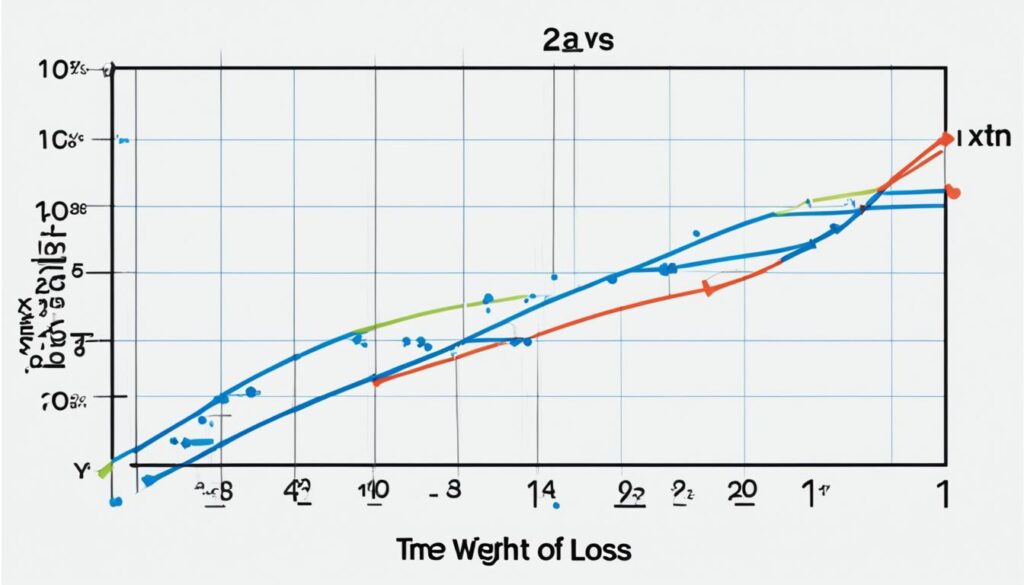I know how frustrating a weight loss plateau can be. It’s when the scale won’t budge, even if you’re trying hard. Everyone seems to face this roadblock about a year into their diet, studies say.
So, what causes this? Your body just gets used to your daily food and exercise. Oddly enough, losing weight makes us hungrier. For every pound lost, we might feel the need to eat 83 more calories every day.
But don’t give up! Knowing why plateaus happen helps us keep going. They’re a normal part of the journey, not a dead end. With a little science and some smart moves, we can beat these plateaus. Then, it’s smooth sailing to our health goals.
Understanding the Weight Loss Plateau Phenomenon
Weight loss plateaus can be really frustrating. I know from my own experience. It stops you from losing more weight even when you’re trying hard.
What is a Weight Loss Plateau?
A weight loss plateau happens when your weight doesn’t change. This can make your weight loss journey harder. Your body gets used to the changes, and it slows down. This makes it hard to keep losing weight.

When Do Plateaus Typically Happen?
After making steady progress for a few weeks or months, you might hit a plateau. The timing varies for everyone. For some, it comes after a 10% weight loss. For others, it might be sooner or later. Being aware of these timings can help you not get discouraged.
The Mental Impact of Hitting a Plateau
Plateaus can be really tough on your mind. It’s hard not to feel down when you stop seeing progress on the scale. But remember, plateaus are a normal part of losing weight. They don’t mean you’re not working hard enough. Knowing this can keep you going.
To get through a plateau, you need to be patient and keep at it. Understanding why they happen is key. So, you can change what you’re doing and still reach your goals.
The Science Behind Weight Loss Plateaus

Many people face a stop in weight loss even after making good progress. This can be frustrating. But, there’s a good reason why it happens.
Our bodies work to keep us alive. As we shed pounds, our body slows down its burning of calories. This happens to keep some energy in store. After about 6 months of dieting, this change commonly takes place.
Hormones are key in this too. Eating less makes our body want more food. It makes ghrelin go up, which makes us feel hungry. But, it lowers leptin, which tells us we’re full. So, dieting can be hard because of these mixed signals.
Also, losing weight can mean losing muscle too. If we don’t eat enough, our body uses muscle for fuel. Since muscle burns more calories than fat, this makes things worse. Adding some resistance training can help keep this muscle loss at bay.
To pass through a weight loss plateau, we need to understand these changes. Changing up our strategies can work wonders. Here are a few tips for beating a plateau:
- Up your protein to save your muscles
- Change how many calories you eat based on your current weight
- Keep exercises new to challenge your body
- Sleep enough to help your hormones stay balanced
Plateaus are just bumps in the weight loss road. With some patience and new strategies, we can keep moving towards our target weight.
Common Causes of Weight Loss Plateaus
There are many reasons weight loss plateaus happen. Often, it’s hard to keep losing weight, even if we are trying our best. Let’s look at the main causes of weight loss plateaus and how they slow our progress.
Metabolic Adaptations
When we eat less, our bodies can slow down. This makes us burn fewer calories when resting. So, losing weight becomes tougher. Our bodies are trying to save energy, which can stop weight loss.
Hormonal Changes
Our hormones do a lot when we’re trying to lose weight. Dieting can change our hunger and fullness hormones. You might feel hungrier while finding it harder to feel full. This makes dieting tough to stick with.
Not Enough Protein
Eating enough protein is key for losing weight. Without it, we might lose muscle. Having less muscle means our metabolism slows, which helps cause a weight loss plateau.
Sleep and Stress
Not sleeping well and being stressed can mess up our weight loss goals. Bad sleep can make us want to eat more and choose unhealthy foods. Stress increases a hormone that can store more fat, often around our belly.
By understanding these issues, we can fight back against weight loss plateaus. Working on these areas can help us get back to losing weight.
Why Weight Loss Plateau Occurs: Key Factors
Knowing why we hit a weight loss plateau is key. Our bodies may start spending less energy when we eat fewer calories. This makes losing weight harder over time. Read more about this here.
The set point theory is also important. Our bodies like to keep a certain weight. When we try to lose weight, our metabolism might slow. This can make us feel hungrier. And we might eat more without even realizing it.
When we lose weight, we can lose muscle as well. And muscle helps us burn calories. So, losing muscle can slow down our metabolism. Adding strength training can help. Remember, plateaus are normal and can last a few months. But, keep up those healthy habits. You’ll break through eventually.
